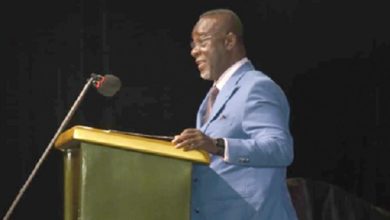Fidelity Bank Ghana posts robust performance for 2024

Fidelity Bank Ghana, the nation’s largest privately owned indigenous bank, has delivered a strong performance, with operating income growing by 15 per cent to GH¢2.34 billion at the end of last year, up from GH¢2.03 billion at the end of 2023.
With a performance that marks the second consecutive year of surpassing GH¢2 billion in annual revenues, the bank’s profit before tax also grew by four per cent to GH¢1.21 billion, indicating stability in the face of a difficult operating environment.
Speaking at its Annual General Meeting (AGM), the Board Chairman of Fidelity Bank, James Reynolds Baiden, said the bank’s performance on all indicators showcased robustness, strategic resilience and a commitment to innovation.
He told the shareholders that Fidelity Bank’s total assets also grew by 28 per cent to settle at GH¢22.11 billion, driven primarily by a robust 40 per cent growth in deposits of GH¢17.65 billion.
“I am proud to say that the bank has made significant strides in a very challenging business environment beset with persistently high inflation, sharp currency fluctuations, tight financing conditions, and regulatory changes.
Despite these exigencies, including Ghana’s external debt restructuring, which imposed substantial losses on banks, we delivered strong results,” Mr Baiden said.
He acknowledged the impact of external shocks, including a 37 per cent haircut on Ghana’s Eurobond holdings and income loss due to the increased cash reserve requirements.
“Our ability to navigate these challenges underscores the strength of our balance sheet and risk management framework,” the Board Chairman of Fidelity Bank added.
Prudent risk management
Mr Baiden said in spite of a sector-wide decline in asset quality, Fidelity Bank prioritised the health and quality of its lending portfolio.
Hence, the bank’s loans and advances of GH¢3.14 billion were a reflection of a measured and disciplined growth strategy aimed at navigating the high-risk environment effectively, he said, adding that Fidelity Bank maintained a non-performing loan (NPL) ratio below 10 per cent, significantly below the industry average.
The Board Chairman said the bank’s investments in securities grew by three per cent to GH¢7.90 billion, with shareholders’ funds recording a growth of 44 per cent to end 2024 at GH¢2.07 billion.
That put the bank’s capital adequacy ratio, without regulatory reliefs, from 14.38 per cent in 2023 to 19.55 per cent at the end of last year.
In recognition of the performance, shareholders approved an ordinary dividend of GH¢8 per share for the year under review, 2024.
Outlook
Looking ahead, Mr Baiden affirmed the bank’s strategic focus on enhancing customer experience, driving sustainable growth and improving operational agility.
“We are prioritising risk management and embedding ESG considerations across our operations, while advancing digital innovation and process efficiency,” he noted.
Achievements
For his part, the Managing Director of Fidelity Bank Ghana, Julian Opuni, explained how the bank deepened its leadership in key segments.
“In 2024, we enhanced our retail and SME lending frameworks with a strong focus on cash-flow-based lending.
Our partnerships with fintechs enabled greater access for underserved markets, particularly in the informal sector,” he said.
Mr Opuni also emphasised operational improvements, saying, “We made significant strides in automation, reduced manual processes, and strengthened internal controls. Our improved data capabilities supported agile decision-making and strategic execution.”
Sustainability, mission-led financing
Mr Opuni told shareholders that in line with its green finance agenda, Fidelity Bank would scale up initiatives such as the Green Tech Innovation Challenge and launch Orange Inspire, a dedicated fund to support Ghana’s creative economy through financing, incubation, and enterprise development.
Last year, the bank’s achievements attracted various accolades, including recognition as Best SME Bank by World Economic Magazine and Global Business and Finance Magazine Awards; Best ESG Bank at the Ghana Accountancy & Finance Awards, and the Best Bank for Sustainable Development by Global Banking & Finance, a feat the Managing Director said reaffirmed the bank’s leadership in sustainability, innovation and inclusive finance.
Looking into the future, Mr Opuni said Fidelity Bank was not only focused on excellence in financial performance, but also on driving change through innovation and purpose and remained committed to delivering long-term value to its customers, shareholders and the communities it served.
In line with its green finance agenda, Fidelity Bank would scale up initiatives such as the Green Tech Innovation Challenge and launch Orange Inspire, a dedicated fund to support Ghana’s creative economy through financing, incubation and enterprise development, the MD said.



